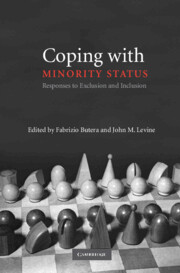Book contents
- Frontmatter
- Contents
- Contributors
- Introduction
- PART I COPING WITH EXCLUSION: BEING EXCLUDED FOR WHO YOU ARE
- 1 On being the target of prejudice: Educational implications
- 2 “To climb or not to climb?” When minorities stick to the floor
- 3 Managing the message: Using social influence and attitude change strategies to confront interpersonal discrimination
- 4 A new representation of minorities as victims
- 5 Marginalization through social ostracism: Effects of being ignored and excluded
- PART 2 COPING WITH EXCLUSION: BEING EXCLUDED FOR WHAT YOU THINK AND DO
- PART 3 COPING WITH INCLUSION
- Index
- References
4 - A new representation of minorities as victims
Published online by Cambridge University Press: 05 June 2012
- Frontmatter
- Contents
- Contributors
- Introduction
- PART I COPING WITH EXCLUSION: BEING EXCLUDED FOR WHO YOU ARE
- 1 On being the target of prejudice: Educational implications
- 2 “To climb or not to climb?” When minorities stick to the floor
- 3 Managing the message: Using social influence and attitude change strategies to confront interpersonal discrimination
- 4 A new representation of minorities as victims
- 5 Marginalization through social ostracism: Effects of being ignored and excluded
- PART 2 COPING WITH EXCLUSION: BEING EXCLUDED FOR WHAT YOU THINK AND DO
- PART 3 COPING WITH INCLUSION
- Index
- References
Summary
A DIALOGUE BETWEEN CHOMSKY AND FOUCAULT
To convey the general meaning of this study, we must first clarify the question it seeks to answer and then delineate the observations that served as its initial impetus. What, then, is the question with which we are concerned? For a short answer, let us go back to the famous 1971 debate between Chomsky and Foucault on the subject of “human nature.” From the very outset, there is a sharp difference of opinion. Foucault asserts that human nature has a social basis and is founded on the drive for dominance and power, while Chomsky stresses its innate character, which is the true basis, the absolute foundation of justice. Here are just a few excerpts from this exchange. Foucault is certain that justice is an instrument of power, “an idea invented and applied in different types of society as an instrument of a certain political and economic power, or as a weapon against this power” (Chomsky & Foucault, 2002, p. 69).
After voicing his disagreement, Chomsky not only reformulates his arguments by including justice as one of man's most deep-seated needs, but also asserts that justice can be ensured by legal means. “In my view,” he states, “it is a bit hasty to characterize our current judicial systems as simple instruments of class oppression; I don't believe that to be the case. While they may incarnate other forms of oppressions, they also incarnate a genuine quest for true concepts of justice, honor, love, goodness, and understanding” (ibid, p. 70).
- Type
- Chapter
- Information
- Coping with Minority StatusResponses to Exclusion and Inclusion, pp. 82 - 103Publisher: Cambridge University PressPrint publication year: 2009
References
- 15
- Cited by



